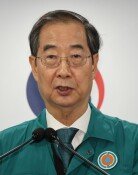Europe’s young politicians in their 30s
Europe’s young politicians in their 30s
Posted October. 17, 2017 07:23,
Updated October. 17, 2017 08:13
Karl Marx-Hof in Vienna, Austria, is world-renowned municipal tenement complexes established in 1930. This is also where you can feel the country’s history come alive. Bullet marks still highly visible on the buildings testify to the 1934 “Austrian Civil War.” Violent clashes between socialists and conservatives eventually led to the annexation of Austria into Nazi Germany.
With sobering lessons from the history, Austria’s left and right political leaders made a wise decision. After the end of World War II, they maintained a grand coalition between center-right and center-left parties for as long as 41 years. This explains why Ahn Byung-young, former Deputy Prime Minister of Education, chose Austria as an alternative to the Korean society in his 2013 book titled “Why Should It Be an Austrian Model?” However, the longtime politics of compromise in Austria now shows signs of falling apart. On Sunday, the People’s Party led by 31-year-old Sebastian Kurz won the country’s general election, and the party could seek an alliance with the populist, far-right Freedom Party that finished second.
With a victory in the general election, Kurz is set to become the world’s youngest national leader democratically elected. He is one of the heads of government in their 30s, who are rising in numbers especially in Europe, including Emmanuel Macron, who was elected president of France at the age of 39; Leo Varadkar, the 38-year-old Irish Prime Minister elected in June; and Luigi Di Maio, who won the primary election to be the Prime Minister candidate of the leading opposition party in Italy’s 2018 election. Ukraine and Estonia also saw young politicians in their 30s be elected as prime ministers last year. What these young leaders have in common is that they appeal to voters by getting closer to and directly communicating with them.
As shown by the election of Kurz and Varadkar, center-right parties are noticeably gaining ground in Europe, which is struggling with a refugee crisis and sluggish economy. Germany and Spain are also being paid attention to as young politicians in their 30s challenged the existing two-party system. Young politicians are effectively using the general dissatisfaction with established politics while promising not to be constrained by ideology and to make a real change in areas such as the labor market. While Europe is well going through the shift of generations in politics, Korea, where politicians in their 40s rose to power in the 1970s, is now witnessing the opposite. Korea’s political parties may be divided based on ideology, but both liberals and conservatives seem to be fully united on one front: setting up a higher barrier to rookie politicians so that they can hold on to power. Can this situation get bleaker?







